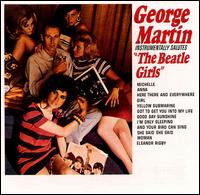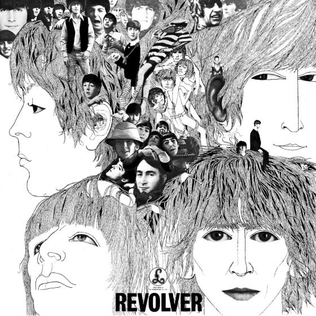
Revolver is the seventh studio album by the English rock band the Beatles. It was released on 5 August 1966, accompanied by the double A-side single "Eleanor Rigby" / "Yellow Submarine". The album was the Beatles' final recording project before their retirement as live performers and marked the group's most overt use of studio technology to date, building on the advances of their late 1965 release Rubber Soul. It has since become regarded as one of the greatest and most innovative albums in the history of popular music, with recognition centred on its range of musical styles, diverse sounds, and lyrical content.
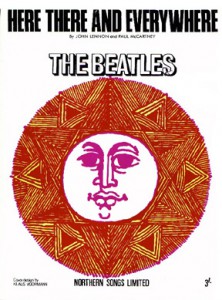
"Here, There and Everywhere" is a song by the English rock band the Beatles from their 1966 album Revolver. A love ballad, it was written by Paul McCartney and credited to Lennon–McCartney. McCartney includes it among his personal favourites of the songs he has written. In 2000, Mojo ranked it 4th in the magazine's list of the greatest songs of all time.
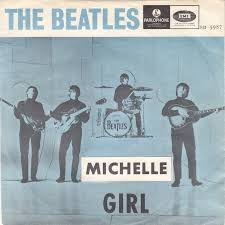
"Michelle" is a song by the English rock band the Beatles from their 1965 album Rubber Soul. It was composed principally by Paul McCartney, with the middle eight co-written with John Lennon. The song is a love ballad with part of its lyrics sung in French.
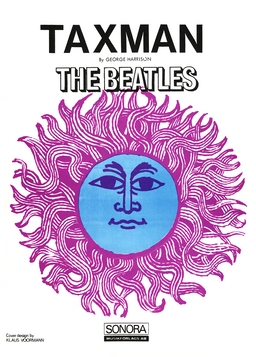
"Taxman" is a song by the English rock band the Beatles from their 1966 album Revolver. Written by the group's lead guitarist, George Harrison, with some lyrical assistance from John Lennon, it protests against the higher level of progressive tax imposed in the United Kingdom by the Labour government of Harold Wilson, which saw the Beatles paying over 90 per cent of their earnings to the Treasury. The song was selected as the album's opening track and contributed to Harrison's emergence as a songwriter beside the dominant Lennon–McCartney partnership. It was the group's first topical song and the first political statement they had made in their music.

"Paperback Writer" is a song by the English rock band the Beatles. Written primarily by Paul McCartney and credited to the Lennon–McCartney partnership, the song was released as the A-side of their eleventh single in May 1966. It topped singles charts in the United Kingdom, the United States, Ireland, West Germany, Australia, New Zealand and Norway. On the US Billboard Hot 100, the song was at number one for two non-consecutive weeks, being interrupted by Frank Sinatra's "Strangers in the Night".

"I'm Only Sleeping" is a song by the English rock band the Beatles from their 1966 studio album Revolver. In the United States and Canada, it was one of the three tracks that Capitol Records cut from the album and instead included on Yesterday and Today, released two months before Revolver. Credited as a Lennon–McCartney song, it was written primarily by John Lennon. The track includes a backwards lead guitar part, played by George Harrison, the first time such a technique was used on a pop recording.

"And Your Bird Can Sing" is a song by the English rock band the Beatles. It was released on their 1966 album Revolver, apart from in the United States and Canada, where it instead appeared on Yesterday and Today. The song was written mainly by John Lennon and credited to Lennon–McCartney. The recording features an extended dual-guitar melody, played by George Harrison and Paul McCartney, which anticipated the harmonised guitar arrangements commonly used by Southern rock, hard rock and heavy metal bands.
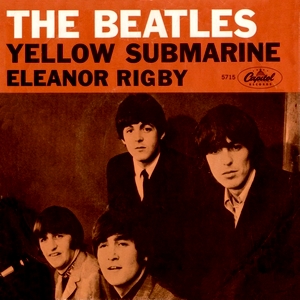
"Eleanor Rigby" is a song by the English rock band the Beatles from their 1966 album Revolver. It was also issued on a double A-side single, paired with "Yellow Submarine". The song was written primarily by Paul McCartney and credited to Lennon–McCartney.
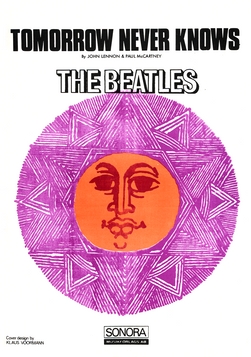
"Tomorrow Never Knows" is a song by the English rock band the Beatles, written primarily by John Lennon and credited to Lennon–McCartney. It was released in August 1966 as the final track on their album Revolver, although it was the first song recorded for the LP. The song marked a radical departure for the Beatles, as the band fully embraced the potential of the recording studio without consideration for reproducing the results in concert.

"She's Leaving Home" is a song by the English rock band the Beatles, written by Paul McCartney and John Lennon, and released on their 1967 album Sgt. Pepper's Lonely Hearts Club Band. Paul McCartney wrote and sang the verse and John Lennon wrote the chorus, which they sang together. Neither George Harrison nor Ringo Starr was involved in the recording. The song's instrumental background was performed entirely by a small string orchestra arranged by Mike Leander, and is one of only a handful of Beatles recordings in which none of the members played a musical instrument.

"Love You To" is a song by the English rock band the Beatles from their 1966 album Revolver. The song was written and sung by George Harrison and features Indian instrumentation such as sitar and tabla. Following Harrison's introduction of the sitar on "Norwegian Wood " in 1965, it was the first Beatles song to fully reflect the influence of Indian classical music. The recording was made with minimal participation from Harrison's bandmates; instead, he created the track with tabla player Anil Bhagwat and other Indian musicians from the Asian Music Circle in London.
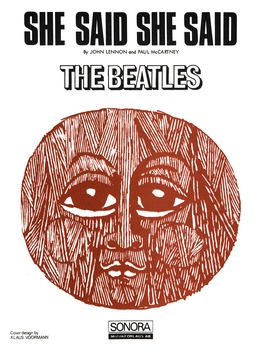
"She Said She Said" is a song by the English rock band the Beatles from their 1966 album Revolver. Credited to Lennon–McCartney, it was written by John Lennon with assistance from George Harrison. Lennon described it as "an 'acidy' song" with lyrics inspired by actor Peter Fonda's comments during an LSD trip in August 1965 with members of the Beatles and the Byrds. "She Said She Said" was the last track recorded for Revolver. Due to an argument over the song's musical arrangement, Paul McCartney walked out of the studio during the song's recording.
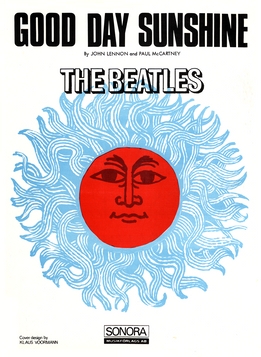
"Good Day Sunshine" is a song by the English rock band the Beatles from their 1966 album Revolver. It was written mainly by Paul McCartney and credited to the Lennon–McCartney partnership. McCartney intended it as a song in the style of the Lovin' Spoonful's contemporaneous hit single "Daydream". The recording includes multiple pianos played in the barrelhouse style and evokes a vaudevillian mood.

"I Want to Tell You" is a song by the English rock band the Beatles from their 1966 album Revolver. It was written and sung by George Harrison, the band's lead guitarist. After "Taxman" and "Love You To", it was the third Harrison composition recorded for Revolver. Its inclusion on the LP marked the first time that he was allocated more than two songs on a Beatles album, a reflection of his continued growth as a songwriter beside John Lennon and Paul McCartney.
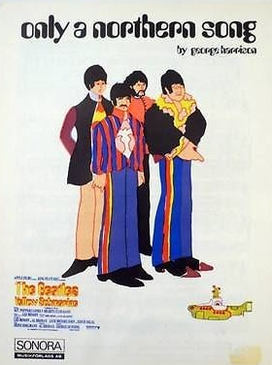
"Only a Northern Song" is a song by the English rock band the Beatles from their 1969 soundtrack album Yellow Submarine. Written by George Harrison, it was the first of four songs the band provided for the 1968 animated film Yellow Submarine, to meet their contractual obligations to United Artists. The song was recorded mainly in February 1967, during the sessions for Sgt. Pepper's Lonely Hearts Club Band, but the Beatles chose not to include it on that album. The group completed the recording two months later, straight after finishing work on Sgt. Pepper.
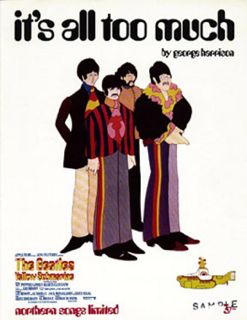
"It's All Too Much" is a song by the English rock band the Beatles from their 1969 album Yellow Submarine. Written by George Harrison in 1967, it conveys the ideological themes of that year's Summer of Love. The Beatles recorded the track in May 1967, shortly after completing their album Sgt. Pepper's Lonely Hearts Club Band. It was one of four new songs they then supplied for the 1968 animated film Yellow Submarine, to meet their contractual obligations to United Artists.

"Yellow Submarine" is a song by the English rock band the Beatles from their 1966 album Revolver. It was also issued on a double A-side single, paired with "Eleanor Rigby". Written as a children's song by Paul McCartney and John Lennon, it was drummer Ringo Starr's vocal spot on the album. The single went to number one on charts in the United Kingdom and several other European countries, and in Australia, Canada and New Zealand. It won an Ivor Novello Award for the highest certified sales of any single written by a British songwriter and issued in the UK in 1966. In the US, the song peaked at number two on the Billboard Hot 100 chart.

Yellow Submarine is the tenth studio album by English rock band the Beatles, released on 13 January 1969 in the United States and on 17 January in the United Kingdom. It was issued as the soundtrack to the animated film of the same name, which premiered in London in July 1968. The album contains six songs by the Beatles, including four new songs and the previously released "Yellow Submarine" and "All You Need Is Love". The remainder of the album is a re-recording of the film's orchestral soundtrack by the band's producer, George Martin.

Beatles Arias is a 1967 LP recorded by American-born mezzo-soprano Cathy Berberian. The original album consists of twelve of Berberian's distinctive operatic-style cover versions of songs by The Beatles, scored for a small chamber ensemble, consisting of a string quartet or wind quintet with harpsichord or organ. The chamber arrangements were by Paul Boyer, and featured Guy Boyer on harpsichord and organ, with an unnamed French string quartet and a wind quintet. Berberian was inspired to create this album while singing along to her 13-year-old daughter's Beatles records.
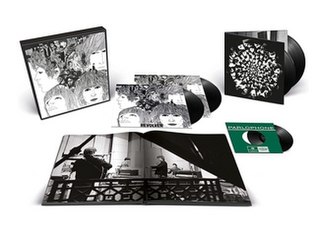
Revolver: Special Edition is an expanded reissue of the 1966 album Revolver by the English rock band the Beatles. It was released on 28 October 2022, and includes a new stereo remix of the album by Giles Martin, with the help of de-mixing technology developed by Peter Jackson's WingNut Films, as well as the original mono mix, session recordings, demos, and an EP including new mixes of the non-album single "Paperback Writer" and its B-side, "Rain", recorded during the Revolver sessions.
